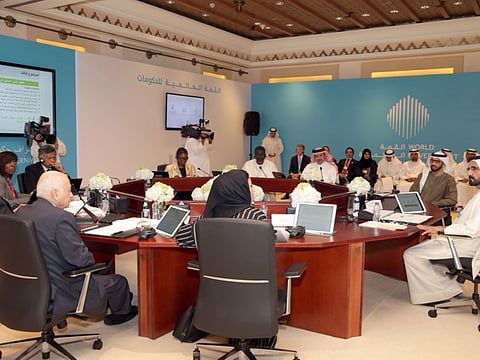Mohammad launches Humanitarian Declaration
Dubai Humanitarian Declaration aims to enhance sustainable humanitarian practices and effective emergency management approach

Dubai: A humanitarian declaration calling for adopting an effective crisis and emergency management approach has been launched.
The Dubai Humanitarian Declaration was launched yesterday (Sunday) by His Highness Shaikh Mohammad Bin Rashid Al Maktoum, Vice-President and Prime Minister of the UAE and Ruler of Dubai, as he chaired the first meeting of the Humanitarian Consultative Council at Mina Al Salam Hotel.
The declaration calls for sustainable humanitarian practices by adopting an efficient approach towards emergency response and encourages cooperation between the human community and the private sector.
It aims to create strategic partnerships for sustainable humanitarian work and support innovative solutions and work mechanisms to improve humanitarian work and increase its efficiency. “Our country always strives to deal with challenges facing the region and the world on all social, humanitarian and economic levels,” Shaikh Mohammad said.
He added that the declaration is in line with the 2030 Agenda for Sustainable Development and rapid changes that require giving priority to a number of humanitarian initiatives that help overcome challenges facing the entire world.
“With the determination and will of the UAE’s wise leadership, we are following in the footsteps of the founding father of our state, the late Shaikh Zayed Bin Sultan Al Nahyan, the leader and the teacher who laid the UAE’s humanitarian approach, making our country rank first globally twice in humanitarian aid in 2013 and 2014,” the Vice-President said.
The UAE has added a milestone in development work as it ranked as one of the major donor countries in development assistance on the official level.
“The world is experiencing rapid crises as 21 disasters were registered worldwide last year, out of which 18 were man-made calamities while only three were natural disasters,” Shaikh Mohammad said.
The man-made and natural disasters resulted in the migration and displacement of 20 million people and the fleeing of 60 million worldwide, said Shaikh Mohammad, adding that the international finance covers 35 per cent of the current emergency needs.
The meeting was attended by Shaikh Hamdan Bin Zayed Al Nahyan, Ruler’s representative in the Western Region and President of Emirates Red Crescent (ERC); Dr Nabeel Al Arabi, secretary-general of the Arab League, and Dr Abdul Latif Al Zayani, secretary-general of the Gulf Cooperation Council (GCC).
The council discussed a number of important humanitarian issues and ways to promote constructive dialogue and create exceptional methods that help set standards for humanitarian work.
Mohammad Abdullah Al Gergawi, Minister of Cabinet Affairs, and Shaima Al Zarouni, director-general of the International Humanitarian City (IHC), were also present.
The council reviewed a host of recommendations that came as the outcome of a series of round-table meetings by leading private sector leaders as part of the Private Sector Frontiers Round Table Series organised by IHC in November.
The roundtables were held in collaboration with MasterCard that focused on the use of modern communication and payment technologies to enhance humanitarian relief funding and efforts.
The council also referred to the important role by IHC’s Global Humanitarian Impact Fund (GHIF) to enhance the contribution of the private sector to humanitarian work.
The second meeting will be held in December to coincide with the World Humanitarian Conference that will take place in Dubai.
Sign up for the Daily Briefing
Get the latest news and updates straight to your inbox



